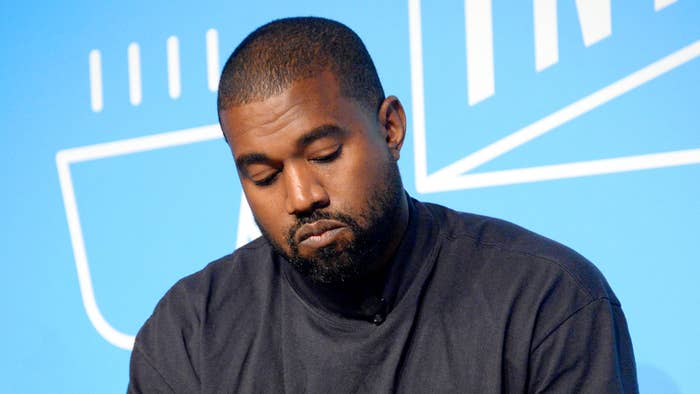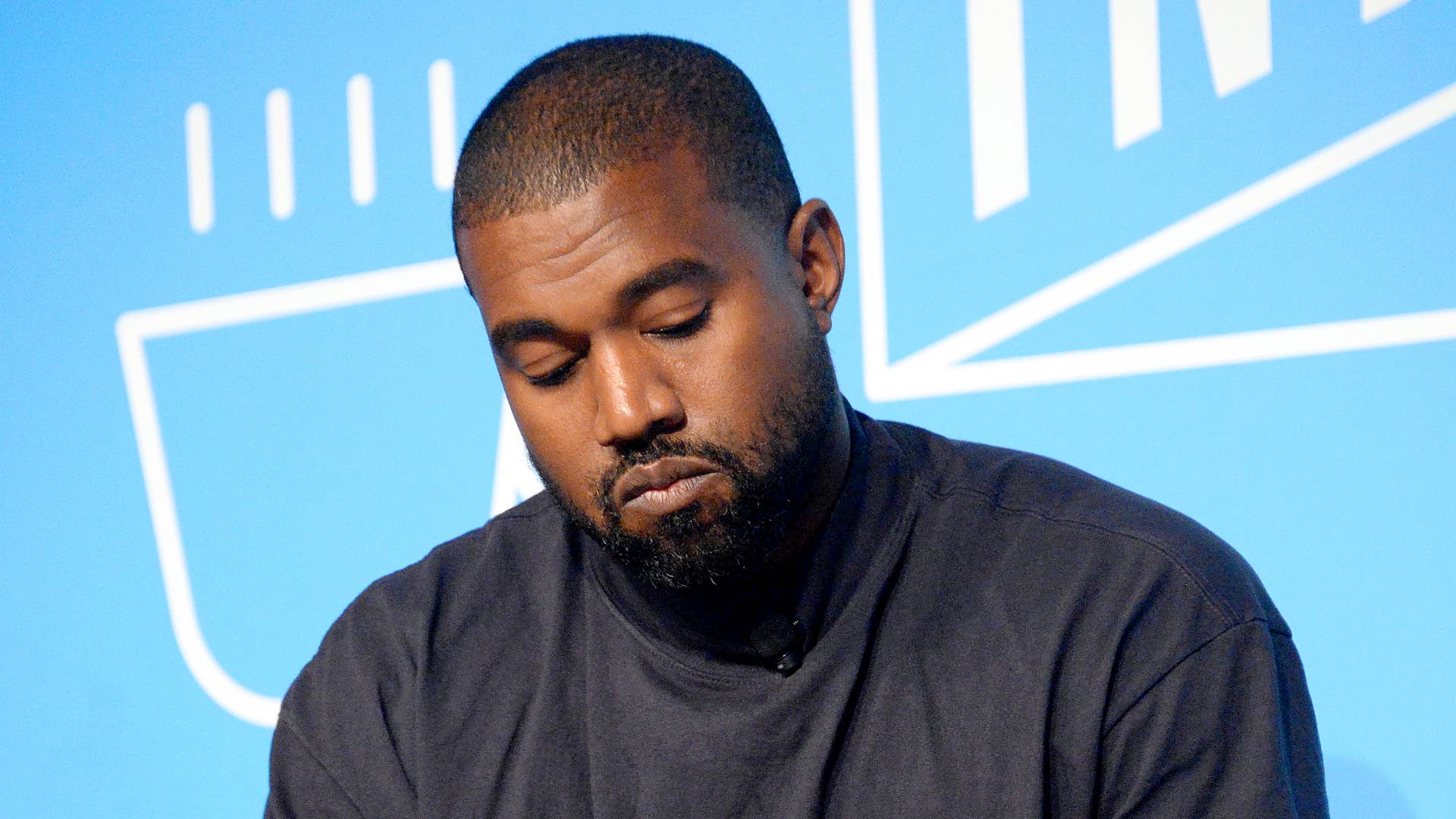
Kanye West isn’t wrong about the need for a more equitable music industry, but he’s so wrong about so much else that it’s hard to know what to make of his advocacy.
This week, Kanye took his fight with Universal Music Group public, demanding his masters and a release from a restrictive contract that he posted in full on Twitter. In typical Kanye fashion, his exploits quickly devolved into self-parody that reaffirmed why he’s the wrong messenger at the moment.
He asserted in a deluge of tweets that “I’m not gonna watch my people be enslaved,” and “I’m putting my life on the line for my people.” That’s an admirable sentiment. But those eager to rally behind Kanye should consider the source. While he preaches against music industry “enslavement,” his “presidential campaign” is being manipulated to enable a presidential administration that’s literally enslaving (and mutilating) people at ICE detention camps, among other human rights abuses.
There’s been immense speculation about Kanye’s mental health, especially after a tumultuous summer that his family believed was derived from a manic episode. His recent actions only reinforce those concerns. Yesterday, he was making valid points about the music industry’s shady business model, but his graphic display of disapproval for the Grammy committee called into question whether he was having another episode. He eventually got banned from tweeting for the day, which halted any chances to make valid points about the industry.
The headlines shifted from “Kanye Calls Out Music Industry Inequality” to “Kanye Pees On Grammy.” After several years of cringeworthy headlines, this could have been a rare moment in which he garnered public support for a much-needed fight for artists rights. But instead, so much of the reaction has been about his bathroom antics. It was as if he had typed a manifesto in a word processor, sought to end it with an exclamation point, but ended up deleting his entire message with the exclamation point. Unfortunately for Kanye, there’s no “undo” on his public bombast.
Kanye has paralleled his fight with Universal to Michael Jackson and Prince’s fights with Sony and Warner, respectively. Both iconic pop acts fought the industry in the court of law, while using public spectacle to gain favor in the court of public opinion. In the ‘90s, Prince wrote “Slave” on his cheek and changed his name into an unpronounceable symbol, asking Rolling Stone, “If I can't do what I want to do, what am I?”
This could have been a rare moment in which he garnered public support for a much-needed fight for artists rights. But instead, so much of the reaction has been about his bathroom antics.
In 2002, Michael Jackson held a public press conference condemning Sony Records and then-CEO Tommy Mottola as “racist” and “devilish” in their artist practices. Jackson was in business with Sony, through Sony/ATV, a publishing company the two entities formed in 1995. Kanye recently referenced the theory that Jackson was “killed” for his remaining 50% share of Sony/ATV, which stoked emotion and got some people to rally around him as the next hero ready to take on the industry.
But unlike MJ and Prince, Kanye gave out the same deals he’s condemning as head of G.O.O.D. Music. He publicly posted his contract, but none from G.O.O.D. Music artists, likely because they would expose him as a hypocrite like most Black music executives. Industry veteran Wendy Day challenged, “You own a label @Kanyewest! Post those contracts too. Look at what you’ve signed G.O.O.D. artists into because you were following the advice of lawyers (who get a % of your income, most likely)... the knife cuts both ways.”
Artist Adamn Killa accused Kanye of trying “to sign me for $35k with my publishing included.” He spoke for many by adding, “I agree with what you saying but how many artist you enslaving too?”
Kanye appears to be the latest rap label head feigning Black solidarity while committing the practices they condemn. It’s easy for him, Diddy, and others to sway the public against greedy white executives, but harder to hold themselves accountable for their sustenance of an exploitative industry model. During his tweetstorm, he surmised, “I am the only person who can speak on this because I made mutli billions outside of music.” The comment frames him as yet another billionaire trying to frame his fight with the establishment as a social issue to gain public support, while offering the working class nothing in their fight for social justice. He wants us to help the rich get richer, but he’s helped the poor get nothing. As June’s uprising showed, entertainers are prone to co-opt the messaging of revolution at the same time that they're deafeningly quiet when the people need them to challenge their bosses.
Kanye donated $2 million and college tuition to George Floyd’s daughter, but his disastrous “presidential campaign” is another reason that most Black people are loathe to support his fight. A New York Times investigation exposed that Kanye’s campaign, which has amounted to the world’s most elaborate publicity stunt, is being steered Trump allies who are intent on using him to muddy the Black vote. Consider this admission from Republican political operative Stuart Stephens in his It Was All A Lie book: “Race was the key in which much of American politics and certainly all of southern politics was played. It was really very simple: the Democratic candidate needed 90-plus percent of black votes to win. If a significant portion voted for a third party, the Republican would win.”
To be clear, disdain for Kanye’s campaign doesn’t hinge on whether he actually has a chance to win or get significant votes to derail the election (he doesn’t). It’s the gall of placing himself in such a sensitive position. Trump is involved in across-the-board human rights abuses, and none of his corrosive policies will reach Kanye’s cozy Calabasas bubble. The correlation between human suffering and Kanye’s hubris is sickening to think about it. Whether he knew about the involvement of Trump allies in his campaign or not, it’s made people reticent to support Kanye’s fight with Universal.
Like with so many Kanye exploits, no one knows what his intentions are. While apologizing for his “slavery was a choice” comment in 2018, he lamented to Chicago radio station 107.5 WGCI that, “the thing about being called crazy, the biggest stigma that has to be broken is that you instantly get written off. But you might be the only one who knows what they’re talking about.” That’s the case for Kanye these days, especially when he’s so prone to childish outburst and comments. It’s his prerogative to not take medication for his bipolar disorder, because as his wife Kim notes, “it just changes who he is." But he also has to understand that a consequence of that choice is much of the public won’t know how to engage with moments like this.
As I wrote this summer, his personal turmoil isn’t our entertainment. The most sensitive coverage of Kanye’s summer surmised that he, like other entertainers (Azealia Banks included), deserve grace through public trials. They don’t deserve to be ridiculed or called “crazy.” His sentiment about the music industry is valid, but he’s been involved in the same exploitative practices. He’s also been such an unreliable messenger that it’s difficult for people to follow his spectacle without feeling like they’re gawking. It’s unclear if his public attacks on Universal are him being 100% genuine, him merely courting attention, or him having another manic episode. Such ambiguity will probably follow him forever. So while he calls himself Nat Turner, Moses, Baby Putin, and whoever else, we simply can’t call it.

